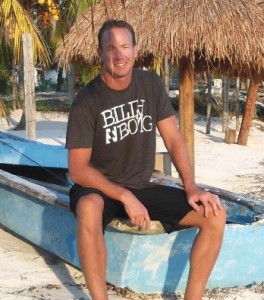Chuck Rylant is proof that taking “risks” can lead to “Freedom”. Chuck went from being a detective in California to creating his own Financial planning business. He is the author of ‘How to be rich : The couple’s guide to a rich life without worrying about money’ and continues to write about business and marketing. He is currently in Mexico working on his next book. So, he is one busy guy!
In this interview, Chuck shares his journey. You are going to want to read this one till the end! He openly talks about everything that at some time or another, has stopped us from moving forward, with simple steps to achieving your goal!
Antonia: You used to be a police detective and you’ve made a major career change. Can you tell us what you’re doing now and what inspired the change? How did you take the first step?
Chuck: These days most of my work is with entrepreneurs and professionals who want more freedom in their lives. In other words, I help them arrange their money, businesses and marketing to create their ideal lifestyle.
At first glance, that seems far removed from law enforcement, but it was really a natural progression. You see, I’ve always been an entrepreneur. I can’t remember a time that I didn’t have a business or side venture of some sort. Some of them never went far, but every experience, successful or not, teaches you something. I’ve had so many unique experiences and with each one I’ve taken greater risks and learned with each one.
When I was a cop, I was the only detective with a business background. Eventually I became the go to guy for all the white collar business related cases. These cases gave me a different challenge and gave a new perspective on business that few have.
At the same time, I was working with co-workers on their retirement, taxes and insurance stuff. This was all informal at first, but to make a long story short, I eventually turned my hobby into a financial planning business and these days I write about consult about money, business and marketing.
Antonia: It did not end at the first try for you. What happened that lead you to try something different? What inspired you to make another change and pursue the 4 Hour Work Week? What is freedom for you?
Chuck: That’s a good question Antonia, because there really never is an end, even though we’re always trying to get there. It’s a never ending journey. I’m finally beginning to understand that.
My initial goal with the financial planning practice was to make some more money doing something I really enjoyed. The dream of a home office was pretty alluring too. I saw another guy doing it, and honestly I was envious. So I set my sights on leaving law enforcement and running a business out of my home.
But the thing is Antonia, when you reach your goals, you often realize they’re not all their cracked up to be. Then you have the choice to settle or move on. I’m not real good at settling.
That said,it doesn’t mean those past choices were mistakes.
It’s all experience that benefits you in the long run.
For example, when I was 21 years old, I became a cop and I planned to change the world. Just like the cops in the movies. What I became instead was a professional writer. I’m exaggerating, but a cop spends about 98 percent of the time writing reports and 2% in car chases and doing the fun stuff that fills movies. I signed up for the 2%. I say this somewhat in jest, but it’s really true of everything in life.
To get back to my business today, I was eventually disillusioned with working from home. It wasn’t the 4 Hour Work Week I envisioned. It wasn’t much different than working in the detective office, except now I was at home. A thirty second commute is cool, but a ten hour day is the same regardless where you are.
There is a lot I’m skipping over for the sake of time, but eventually I shifted my business from one where I met clients one-on-one to meeting by phone and/or Skype. Then I started creating information products like books, CD’s, and online training that allowed me to share the same knowledge I’ve acquired, but instead by working remotely in places such as Isla Mujeres in Mexico. This has been a game changer, but there have been a lot of steps getting there.
Antonia: You spoke about other businesses, and I know at one time you opened a gym that didn’t work out? Having experienced this, can you mention your view on taking risks? I also really loved what you said about learning from your mistakes. Can you also talk about this? Lessons learned from your mistakes. If you could go back, would you change anything?
Chuck: That’s actually a good question because my perspective on risk has changed a lot through the years. I have always been somewhat of a risk taker. I don’t mean crazy risks, dumb, but calculated risks.
Actually, that’s not entirely true. I was on a SWAT team. I’ve driven race cars and I’ve owned a few racing motorcycles, so the more I think about it, I suppose I am a bit of a thrill seeker, but when it comes to business, I mean calculated risks.
Most people live their entire lives desperately afraid of taking chances. Then when they look back they feel they’ve miss out on life. I refuse to do that. As you mentioned, several years ago my wife and I opened a gym and this was my biggest business venture up to that point. For construction, lease and other start-up costs we were on the hook for over $2.5 million and it was a very scary step.
Prior to that, I had many successes under my belt so I was rather confident. Perhaps too confident. It wasn’t that I hadn’t failed before, I certainly had, but I’ve always lived by Thomas Edison’s quote about his 1000 failed light bulb experiments.
He explained them not failures, but each brought him one step closer to the right formula. When you look at failure that way, you begin to only see success in your life.
In the end, we made a lot of mistakes. I mean a lot. It was beyond stressful, but we learned a lot. We closed that failing business and later opened a new model that is now very successful.
It’s amazing how easy things are when you strip away past mistakes and apply only the stuff that works.
That’s the benefit of making mistakes and continuing forward. Most people quit after their first failure and never capitalize on the lessons they’ve learned.
Antonia: I loved your last post on How to Make a Decision!!!! Can you talk about how this has a huge impact between people who succeed and those who don’t? Why do you think people take forever making a decision or never actually taking one?
Chuck: It’s human nature to resist change-so much so that many times people prefer a bad situation to changing to a better one. The saying is:
“The devil you know is better than the devil you don’t.”
Fear of the unknown will keep you from moving forward if you don’t learn to embrace change. It’s easier to delay decisions with excuses. After you’ve done your research, any further delay is simply fear holding you back.
Earlier I mentioned my wife and I could not decide whether to move forward or not opening our gym. When you write a business plan it comes down to making several educated guesses about projected sales and expenses. We were doing something new in the fitness industry so was impossible to predict with certainty how long it would take to build a member base to support our costs.
Just before we started construction planning, I talked with my wife about our sales projections. I don’t remember the numbers, but I explained that if we could get X amount of new members to the gym in Y number of months, we would be rich. If we didn’t make our projections we would lose a lot of money.
We made our forecasts, but in the end, nothing is certain. I finally asked her if it would be worse, to try and fail, or to not try and always wonder?
Her reply was instant and I felt the same. We opened the gym and it wasn’t exactly a business success, but my regrets in life are rarely from mistakes I’ve made, but rather the chances I was too afraid to take.
There is nothing worse in life than looking back and wondering: What if I tried?
Antonia: What has been the most valuable lesson learned throughout everything that has brought you to this point?
Chuck: Hmmm. Good question. I’d have to say it is about time. When I was young, I was focused on buying stuff. Things that would make me look successful. Cars, boats, houses and other junk.
I still like that stuff, but in the end, none of it matters. I’ve had my fair share of toys, and still do, but what I really care about today is experiences. It’s the time doing things I enjoy and being with those I care about.
I have a son now, lost a mother, and recently lost my Grandfather. I was closer to him than my parents. So when I look back I realize just how precious time is.
This obsessive pursuit for career advancement and material objects is common here in North America. But I’ve come to think it’s a waste of life to a certain degree. That’s how I see it now days.
It’s taken me a long time to learn that and I’ve wasted a lot of time working for stuff. Things that when you really think about it, are only to impress other people. Often people you don’t care much about.
Antonia: What would be the 3 most important steps you would give to someone who wants to make a change?
Chuck: I’ll give you a list first, and then explain.
1. Decide the goal
2. Create a list of small, specific milestones
3. Eliminate any excuses
Suppose the goal is to lose weight. That will fail.
Instead the goal needs be to be to fit into a size 8 bathing suit by summer so you can enjoy being on the beach in a bikini. Another is to get in shape to hike up Half Dome at Yosemite by fall.
Those are specific goals with a very clear purpose. The arbitrary “lose weight” type of goals always fail.
Then create small, achievable short-term goals to work towards. For the weight loss it may be to exercise three days a week and drop 5 pounds in one month. Increase that to four days a week and aim for 9 pounds total by the end of month two. These are realistic interim goals with a clear plan.
“A goal without a plan is a wish.”
The last part is a mindset thing. I can’t say this any more bluntly, but eliminate excuses or the words, “I’ll try” from your vocabulary.
If I may be frank, Stop Fucking Around and you can achieve anything you want in life. That’s the difference between those who do and those who don’t.
Antonia: How do you keep going?
Chuck: There are a couple of tricks I use. The first is I set an end date for almost everything I’m working on that is critical.
We like to leave the country at least once a year for a month or longer. To make it happen we set a date well in advance. We calculate a rough cost and then we book it. Then we work our butts off until we’ve made the money to pay for it. That’s a lot different than saying, someday I’d like to take a trip when I have the money. “Someday” never comes.
Another thing I do is I split things into short, medium, and long term projects. Because I get bored so quickly, I can only focus on things for a very short time. I’m writing a book each year now, so those are mid-term projects.
I can only write for 45 minutes to an hour before I lose focus. Then I might move to a short term project like a 45 minute coaching call with a client, and then on to a long term project which may be a new business I have planned for few years out. Finally, I have fill in projects that I do in between things when I have spare moments to fill.
Those two methods have been very helpful in getting a lot of things done in relatively short periods of time.
Antonia: That’s very helpful, but how do you motivate yourself through changes and failures?
Chuck: The most important thing to know is that you WILL fail. Not just once, but repeatedly.
You will fail more often than you will succeed.
When you get the Thomas Edison quote, your perspective on failure changes. You’re no longer making mistakes, you’re testing. Testing is an important step in finding the right formula.
With that mindset, failure is not as devastating, but we’re all still human, so you need to allow yourself the occasional pity party. When you go through challenges, allot yourself some time and do what you need to do. But limit that time. Maybe you have a one hour pity part rule.
You get one hour, or day to get drunk, eat ice cream, watch gossip TV, complain to your friends how the world is conspiring against you, but after your hour, day, or whatever you decide, that’s it… no more complaining. Back to testing.
To learn more about Chuck and find free articles about money, investing and business, visit his blog at http://www.ChuckRylant.com






